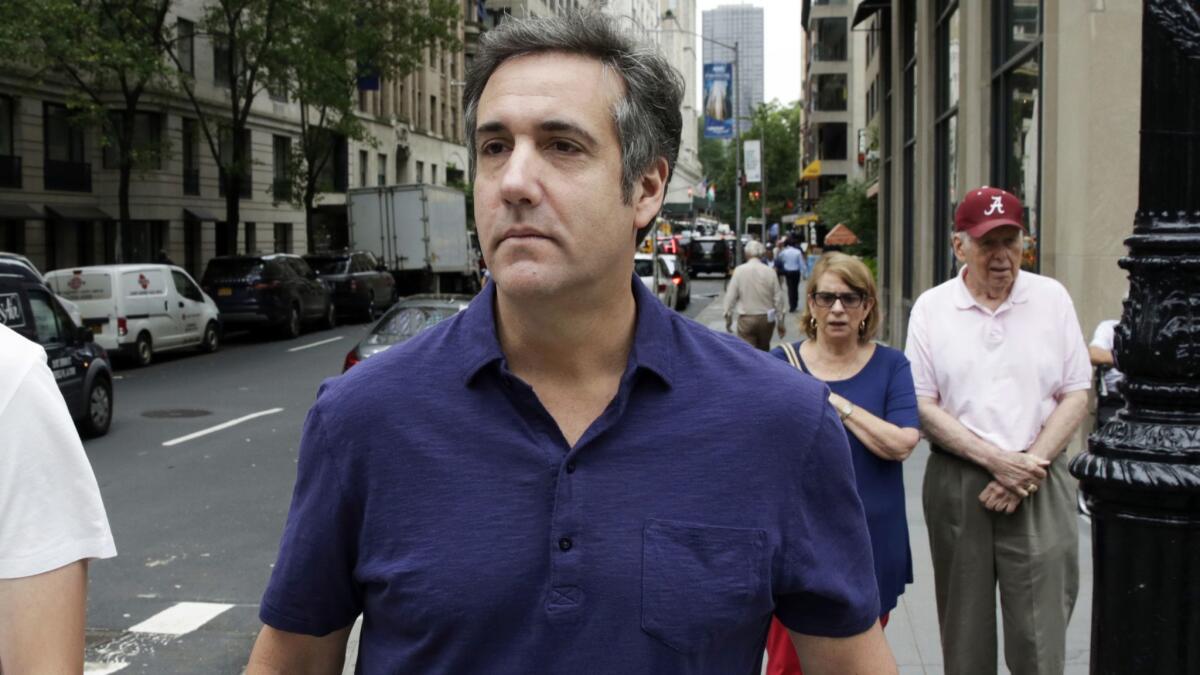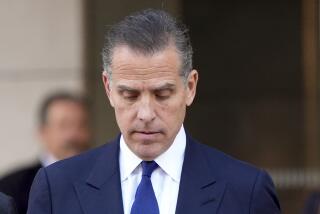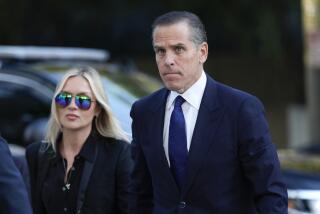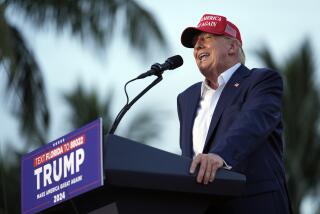Michael Cohen pleads guilty, says he coordinated hush money with Trump to influence election

Reporting from Washington — President Trump’s former personal lawyer and longtime “fixer,” Michael Cohen, pleaded guilty Tuesday to eight charges of felony fraud and campaign finance law violations — and implicated Trump for directing him to arrange payments to buy the silence of two former paramours.
Cohen, a brash New Yorker who had vowed as recently as last year to “take a bullet’’ to protect Trump, now poses what could be a mortal legal threat to his presidency by accusing him in an alleged conspiracy to violate campaign laws.
For the record:
6:40 p.m. Aug. 21, 2018An earlier version of this article said that Cohen obtained reimbursement from the Trump campaign. It was from the Trump Organization.
During a hearing before U.S. District Judge William H. Pauley III in Manhattan, Cohen said he had facilitated $280,000 in hush money payments to porn actress Stormy Daniels and former Playboy model Karen McDougal “in coordination and at the direction of a candidate for federal office.”
Cohen, 51, did not name the candidate, but one of his lawyers, Lanny Davis, tweeted afterward that his client had “testified under oath that Donald Trump directed him to commit a crime by making payments to two women for the principal purpose of influencing an election.”
In his guilty plea, Cohen admitted that he helped arrange the payments during the 2016 presidential election that bought – until after the election – the silence of the two women, who say they had extramarital affairs with Trump years ago. Trump has denied their assertions.
Those payments — $150,000 from the parent company of the National Enquirer in September 2016 to McDougal, and $130,000 the next month from Cohen himself to Daniels, whose real name is Stephanie Clifford — violated federal campaign law, according to terms of the guilty plea.
The law prohibits corporations from donating to a candidate for federal office. Though Cohen personally made the payment to Daniels, he later obtained reimbursement from the Trump Organization. The law forbids individuals from donating more than $2,700 per election to a federal candidate.
Cohen could be sentenced to several years in prison, although his sentence could be reduced in exchange for cooperation with special counsel Robert S. Mueller III’s investigation of Russian interference in the 2016 election and its possible collaboration with Trump’s campaign.
Although nothing was said in court about Cohen’s potential cooperation, Davis said on Twitter that Cohen “is fulfilling his promise” on July 2 to “put his family and country first and tell the truth about Donald Trump.”
The guilty plea was disclosed just as a federal jury in Alexandria, Va., convicted Trump’s former campaign chairman Paul Manafort of eight charges of tax evasion and bank fraud. The judge declared a mistrial on 10 other charges after the jury deadlocked on them.
The Manafort verdict marked a clear victory for the special counsel, who brought the charges. Mueller’s office also collected the initial evidence on Cohen, and passed it to the U.S. attorney’s office in Manhattan.
The two high-profile convictions highlighted the scandals and legal problems that have shrouded the White House since Trump took office. Six people, including the president’s former national security advisor, Michael Flynn, have pleaded guilty.
Robert S. Khuzami, a deputy U.S. attorney, told reporters outside the courthouse that Cohen had paid the money “to silence two women who had information that he believed would be detrimental to the 2016 campaign and to the candidate.’’
Khuzami said Cohen facilitated the payments “for the purpose of influencing the 2016 election.”
Outside legal experts said in interviews that Cohen’s guilty plea on the campaign finance charges poses a direct danger to Trump.
“If [Cohen] violated the campaign finance laws — then there would be risk to Trump and his campaign that they violated the campaign finance laws,’’ said Jan W. Baran, a former general counsel of the Republican National Committee who now is a partner at the Washington law firm Wiley Rein.
Trump ignored reporters’ shouted questions about Cohen’s guilty plea when he landed in Charleston, W.Va., for a nighttime rally with supporters, and the White House declined to comment. Rudolph W. Giuliani, one of the president’s lawyers, defended Trump in a prepared statement.
“There is no allegation of any wrongdoing against the President in the government’s charges against Mr. Cohen,” Giuliani said. “It is clear that, as the prosecutor noted, Mr. Cohen’s actions reflect a pattern of lies and dishonesty over a significant period of time.”
Cohen pleaded guilty to a total of eight felonies. Five counts related to tax evasion, in which he failed to report to the IRS approximately $4.1 million of income. A separate count specified that Cohen lied to a lending institution in obtaining a $500,000 line of credit. The remaining two counts were for his campaign law violations.
Harry Litman, a former U.S. attorney in Pittsburgh who teaches constitutional law at UCLA and UC San Diego, said the significance of Cohen’s guilty plea is “pretty much equivalent to the question, what does Michael Cohen know” about Trump’s conduct.
Much will hinge, Litman said, on Cohen’s knowledge of the circumstances surrounding the payments to McDougal and Daniels, and “whether Trump knew about them.’’ Those payments, Litman said, “very possibly amount to wire fraud, and if Trump was in on them, that’s flat out conspiracy.”
Cohen began working with Trump in 2007, successfully representing the Trump Organization in a dispute with a condominium board in Manhattan. He purchased an apartment in one of the Trump buildings, and wound up representing Trump in various legal disputes.
Prosecutors investigated Cohen for months for possible fraud related to his businesses, including a company that owned and leased taxi-operating permits, known as medallions, in New York City and Chicago. The medallions were worth millions of dollars, according to a 22-page document that prosecutors made public Tuesday. Their value has plummeted in recent years as ride-sharing apps have challenged the city’s taxi industry.
In addition to hiding income from the taxi medallions, Cohen also failed to report to the IRS a $100,000 payment for brokering the sale of property in a “private aviation community” in Florida, according to the document. It also said Cohen hid $30,000 in profits from brokering the sale of a “highly coveted French handbag.”
On April 9, FBI agents working with federal prosecutors in New York raided Cohen’s hotel room, apartment, law office and bank boxes, seizing his computers, cellphones, tax records and other materials. Courts later ruled that prosecutors could review most of the material without violating attorney-client privilege.
Cohen had gained notoriety as Trump’s loyal fixer before the FBI raid, which Trump branded “a witch hunt,” an illegal assault on privacy and a politically motivated attack by enemies in the FBI.
But the president’s initial support for Cohen since has morphed into a public feud, prompting speculation that, to save himself, Cohen might be willing to tell prosecutors some of the secrets he helped Trump keep.
Khuzami, the deputy U.S. attorney in New York, said Cohen’s plea of guilt demonstrates that “we are a nation of laws, and the essence of what this case is about is justice — and that is a level playing field for all persons.’’
UPDATES:
5:35 p.m.: This article was updated with reaction and analysis of Cohen’s guilty plea.
3:25 p.m.: This article was updated with details of the plea deal.
2:18 p.m.: This article was updated with details of the plea arrangement.
12:30 p.m.: This article was updated with details of the expected plea deal.
11:50 a.m.: This article was updated with information Michael Cohen has reached a plea deal.
This article was originally published at 11:30 a.m.
More to Read
Get the L.A. Times Politics newsletter
Deeply reported insights into legislation, politics and policy from Sacramento, Washington and beyond. In your inbox three times per week.
You may occasionally receive promotional content from the Los Angeles Times.











